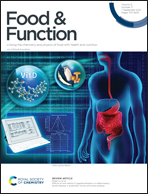Effects of daidzein and genistein on markers of cardiovascular disease risk among women with impaired glucose regulation: a double-blind, randomized, placebo-controlled trial†
Abstract
Background and objective: soy protein and soy isoflavones have been suggested to be associated with improved cardiovascular risk factors (e.g., lipid profiles and uric acid (UA)), but few studies have been conducted among women with impaired glucose regulation (IGR). This study is aimed to evaluate the effect of isolated daidzein and genistein on lipid profiles, high sensitive C-reactive protein (hs-CRP), and uric acid (UA) among Chinese women with IGR. Methods and results: this randomized, double-blind, and placebo-controlled trial was conducted in 165 Chinese women aged 30–70 years with IGR. Participants were randomly assigned to one of the three groups: 0 mg of daidzein and genistein with 10 g soy protein (placebo group), 50 mg of daidzein with 10 g soy protein (daidzein group), or 50 mg of genistein with 10 g soy protein (genistein group) supplementation for 24 weeks. Fasting serum total cholesterol (TC), triacylglycerol (TG), high-density lipoprotein (HDL-C), low-density lipoprotein (LDL-C), lipoprotein a (LP (a)), hs-CRP, and UA were assessed at baseline, 12, and 24 weeks after intervention. The results showed no significant differences in the changes (%) of TC, TG, HDL-C, LDL-C, LP (a), hs-CRP, and UA between the three treatment groups at weeks 12 or 24 (all P > 0.05). Conclusion: neither isolated daidzein nor genistein had a significant effect on cardiovascular health in Chinese women with IGR.



 Please wait while we load your content...
Please wait while we load your content...